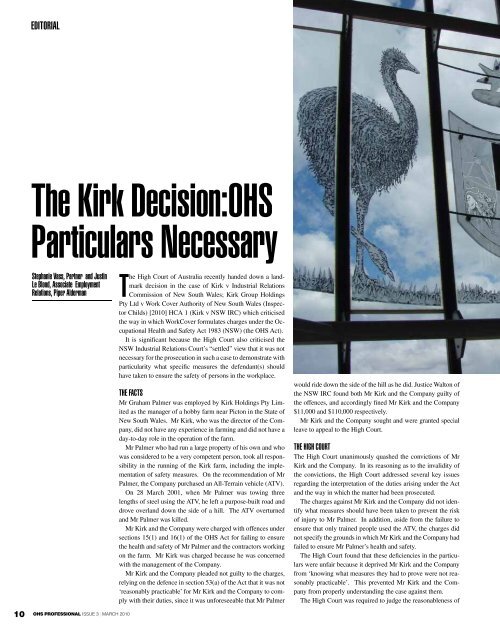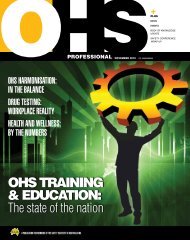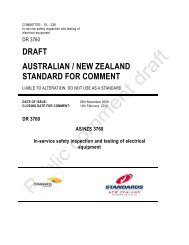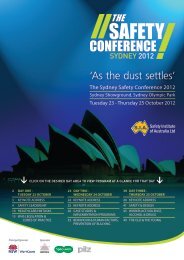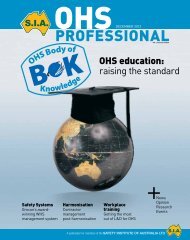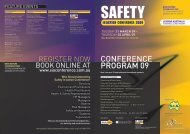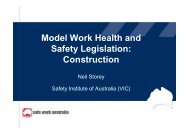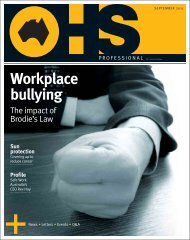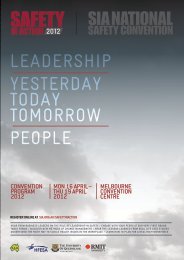Defence: overcoming its âcan Doâ culture unsW kills safety anD risk ...
Defence: overcoming its âcan Doâ culture unsW kills safety anD risk ...
Defence: overcoming its âcan Doâ culture unsW kills safety anD risk ...
Create successful ePaper yourself
Turn your PDF publications into a flip-book with our unique Google optimized e-Paper software.
eDitorialthe kirk Decision:ohsparticulars necessary10stephanie vass, partner and Justinle blond, associate employmentrelations, piper aldermanOHS PrOfeSSiOnaL ISSUE 3 | MARCH 2010the High Court of Australia recently handed down a landmarkdecision in the case of Kirk v Industrial RelationsCommission of New South Wales; Kirk Group HoldingsPty Ltd v Work Cover Authority of New South Wales (InspectorChilds) [2010] HCA 1 (Kirk v NSW IRC) which criticisedthe way in which WorkCover formulates charges under the OccupationalHealth and Safety Act 1983 (NSW) (the OHS Act).It is significant because the High Court also criticised theNSW Industrial Relations Court’s “settled” view that it was notnecessary for the prosecution in such a case to demonstrate withparticularity what specific measures the defendant(s) shouldhave taken to ensure the <strong>safety</strong> of persons in the workplace.the factsMr Graham Palmer was employed by Kirk Holdings Pty Limitedas the manager of a hobby farm near Picton in the State ofNew South Wales. Mr Kirk, who was the director of the Company,did not have any experience in farming and did not have aday-to-day role in the operation of the farm.Mr Palmer who had run a large property of his own and whowas considered to be a very competent person, took all responsibilityin the running of the Kirk farm, including the implementationof <strong>safety</strong> measures. On the recommendation of MrPalmer, the Company purchased an All-Terrain vehicle (ATV).On 28 March 2001, when Mr Palmer was towing threelengths of steel using the ATV, he left a purpose-built road anddrove overland down the side of a hill. The ATV overturnedand Mr Palmer was killed.Mr Kirk and the Company were charged with offences undersections 15(1) and 16(1) of the OHS Act for failing to ensurethe health and <strong>safety</strong> of Mr Palmer and the contractors workingon the farm. Mr Kirk was charged because he was concernedwith the management of the Company.Mr Kirk and the Company pleaded not guilty to the charges,relying on the defence in section 53(a) of the Act that it was not‘reasonably practicable’ for Mr Kirk and the Company to complywith their duties, since it was unforeseeable that Mr Palmerwould ride down the side of the hill as he did. Justice Walton ofthe NSW IRC found both Mr Kirk and the Company guilty ofthe offences, and accordingly fined Mr Kirk and the Company$11,000 and $110,000 respectively.Mr Kirk and the Company sought and were granted specialleave to appeal to the High Court.the high courtThe High Court unanimously quashed the convictions of MrKirk and the Company. In <strong>its</strong> reasoning as to the invalidity ofthe convictions, the High Court addressed several key issuesregarding the interpretation of the duties arising under the Actand the way in which the matter had been prosecuted.The charges against Mr Kirk and the Company did not identifywhat measures should have been taken to prevent the <strong>risk</strong>of injury to Mr Palmer. In addition, aside from the failure toensure that only trained people used the ATV, the charges didnot specify the grounds in which Mr Kirk and the Company hadfailed to ensure Mr Palmer’s health and <strong>safety</strong>.The High Court found that these deficiencies in the particularswere unfair because it deprived Mr Kirk and the Companyfrom ‘knowing what measures they had to prove were not reasonablypracticable’. This prevented Mr Kirk and the Companyfrom properly understanding the case against them.The High Court was required to judge the reasonableness of


